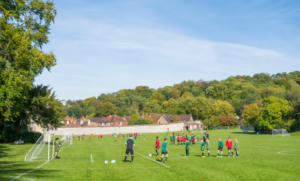Head of sports charity hails partnership that allows local people to use London independent school’s football pitch
 |
|
Analysis shows pupils at England’s top private schools have access to 10 times more green space on average than state school pupils. Photograph: Islandstock/Alamy
Children in the UK urgently need more easy-to-access green space, according to the head of a sports charity calling on private schools to open up their grounds.
Kieran Connolly foundeed Sports Fun 4 All, which offers free football sessions to children in south London, and now works with a local private school that opens up one of its football pitches for his teams.
Connolly said: “I think every child should have the same opportunity to play regardless if they go to a private school or a state school. It shouldn’t matter what their background is, they should all have the same opportunity.”
Connolly grew up in south-east London and played on the Catford Pitz pitches there before they were bought in 2011 by St Dunstan’s college. He said: “Pitz was a bit of a lifesaver for me, and I think many other young people. The gate was just open, you could go in and play. There was space for everybody. You’d go there, meet people, play matches, meet with your friends, spend hours there. They weren’t even locked, you just go there and play for free.”
However, the £22,599-a-year independent school initially reserved the fields for sole use by its students.
Connolly contacted councillors who were able to help him persuade the school to allow the charity to use its floodlit pitches once a week to provide football sessions for young people in Catford.
Since August last year, St Dunstan’s has given free access to Sports Fun 4 All for an hour every Monday after the school day ends. The school has also become more involved with local community groups, schools in and around Catford, and its latest partnership is with Chelsea FC, which will include hosting regular tournaments on the site for local state schools.
And most recently, through a partnership with St Dunstan’s college, Lewisham council and the Westside Young Leaders Academy, the Lewisham Young Leaders Academy (LYLA) was established to help disadvantaged African, Caribbean and dual-heritage children aged eight to 18. The space is also opened up free of charge to local primary schools to use for their sports days.
Connolly’s team has gained steady numbers of regular attenders, and this summer they entered their first under-14s tournament.
Catford is situated in Lewisham and Trust for London data shows a third of children in the borough are living in poverty.
Recently, a Guardian investigation found that children at England’s top private schools have access to 10 times the amount of green space that the average state school pupil has access to, while there are some state school pupils who have no access to playgrounds or playing fields at all.
The Guardian has mapped out the land owned and used by the top public schools in the country – an area never previously established. Using publicly available information, the analysis looked at the schools in the Heads’ Conference – the association of the heads of the UK’s top private fee-charging day and boarding schools – and used satellite tools to differentiate between school buildings and the green space around them.
The analysis established that the average student at one of these schools has access to approximately 322 sq metres of green space, while the average state school student has access to about 32 sq metres of green space, a ratio of 10:1.
While Connolly is grateful to now be able to run the sessions, he would love all children to have easy access to green space in the way private school students have. “It would be better if we had way more floodlit facilities and green spaces for these young people to play sport and football. We’re not here to make the next professional footballer. What we have done is given hundreds of young people access to a free space every single week that they otherwise wouldn’t be able to access.”
The college said: “St Dunstan’s college believes in a broader educational purpose that supports the ongoing aspirations of the local community in Catford and the wider borough of Lewisham. St Dunstan’s works with local partners to provide life-enhancing opportunities to local people that seek to promote social mobility, engender wellbeing and improve communities.”
Nadia Shaikh, a campaigner with Right to Roam, said: “The most important formative fundamental green spaces for young people has always been that which they can access quickly and easily. We have a completely unequal distribution of that across the country.
“It’s the local green space that are your incidental engagement pieces with nature throughout your life, that are the kinds of access to nature that give you a sense of belonging and bring that daily sense of respite and peace and calm to your life.”
Kate Ashbrook, the general secretary of the Open Spaces Society, said: “It is vital for children’s health and wellbeing that they have free access to green spaces on their doorsteps. Not only is this an investment in our future, but it is a basic human right, and not something which they should have to pay for.”



